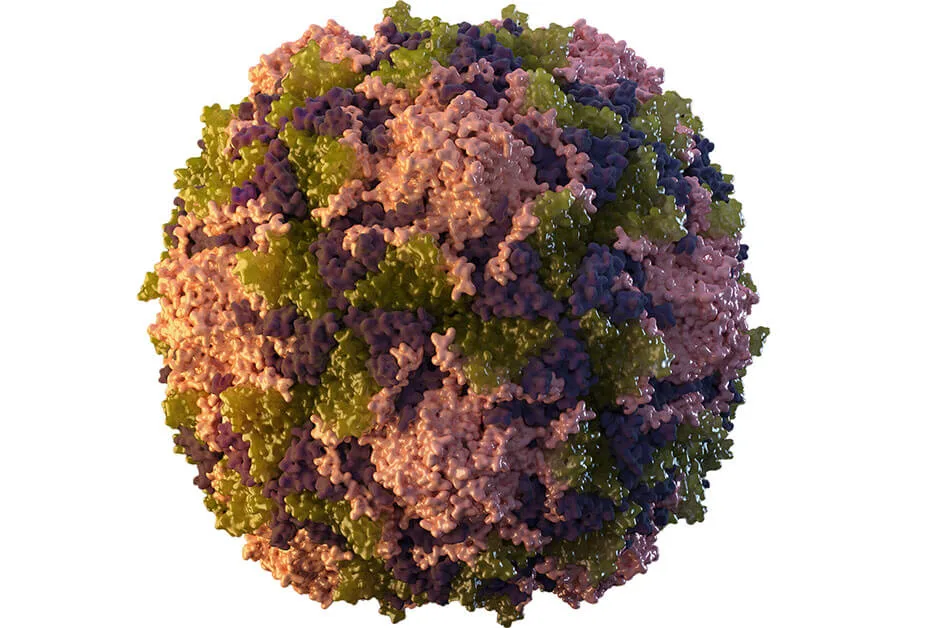
Michigan's health officials plan to expand wastewater testing to include polio, shown above. (Centers for Disease Control)
MICHIGAN–In spring of 2020, COVID-19 was burning its way across the state, and college campuses were prime targets for the virus—students packed in classrooms, dorms, bars quickly became hot spots for superspreaders. Even when testing became available, a large percentage of infected people were asymptomatic—and they would, in turn, infect many more in their community.
Thinking about the problem her campus faced, Joan Rose—a Michigan State University professor who won the 2016 Stockholm Water Prize (the world’s most prestigious water award )—turned to water. Wastewater, that is.
“It’s not biased,” said Rose, who is also co-director for the Center for Water Sciences and Center for Advancing Microbial Risk Assessment at MSU. “It gets the whole community, whether you go in to get tested or not, whether you’re asymptomatic or symptomatic.”
In May of 2020, Rose and her colleagues began testing MSU’s wastewater for COVID-19. What they learned helped campus administrators know when an outbreak was happening in a particular area of campus. They could then make better decisions about in-person events in those regions without having to close all of campus down.

COVID-19 isn’t the only thing found in wastewater. Any viruses that replicate in our stomachs, or that we swallow, and then pass through the stomach and into our waste can be traced through the method. Think hepatitis A and polio, for example. Something like the flu, however, which replicates within cells, cannot be found in wastewater.
“When someone’s infected, the virus replicates and it ends up in the wastewater,” Rose said. “Then by monitoring wastewater, we can follow trends. Is [the amount of virus in the wastewater] increasing? That means more people are getting it. We can follow whether it’s decreasing, we can follow variants.”
COVID-19 is a great example of testing for variants, she said.
“We were able to see Alpha show up in our wastewater with one wave of the disease,” Rose said. “Then Delta showed up with one wave of the disease, and then this final wave (Omicron), which has been pretty big.”
Along with clinical research, wastewater testing can help researchers trying to better understand the virus, by pinpointing which variants have most dangerous, and how they’ve spread through the community, Rose said.
“[COVID-19] was changing, but it didn’t become a variant of concern unless the mutation created a virus that spread more rapidly, caused more hospitalizations, caused more death or different symptoms,” she said
After Rose began testing MSU’s wastewater for COVID-19, other health professionals did the same thing in their regions, greatly increasing the number of wastewater testing sites nationwide. Now, state health officials are recognizing the asset they have, and in the wake of alarming health reports out of New York, are expanding Michigan’s wastewater surveillance to include polio.
This, Rose said, could be the start of a new early detection system for diseases not just here in Michigan, but across the country.
“Now that they’re set up for [COVID-19], which happened over the last year and a half,” she said, “they actually can add new targets, like monkeypox, like polio.”

VIDEO: Trump isn’t the only republican facing charges for alleged financial crimes
https://www.tiktok.com/@gandernewsroom/video/7361494909938978090 A whole lot of Michigan Republicans and lobbyists are facing criminal charges for...

VIDEO: It’s expensive to be poor in Michigan
https://www.tiktok.com/@gandernewsroom/video/7361154790300060974 Ever heard of predatory payday loans? Here’s how new laws could help protect...

Here’s everything you need to know about this month’s Mercury retrograde
Does everything in your life feel a little more chaotic than usual? Or do you feel like misunderstandings are cropping up more frequently than they...

The ’Gander wins multiple 2023 Michigan Press Association awards
MICHIGAN—The ’Gander Newsroom has earned multiple awards in the 2023 Michigan Press Association Better Newspaper Contest. The awards were announced...

Michigan Republicans ask Supreme Court to restrict medication abortion access
A lawsuit supported by Republicans could disrupt access to the most common form of abortion—even in Michigan, where reproductive rights are...






